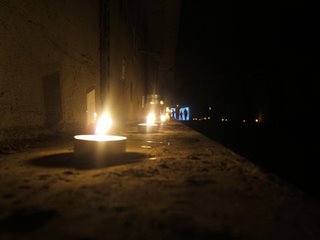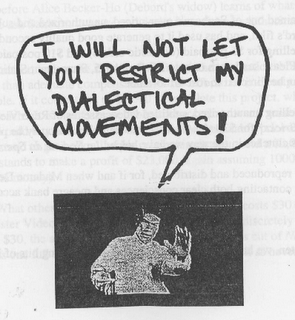It has been over two weeks since my last confession...er...post. There are external reasons for this, the last few weeks have pretty much consisted of the following: a nasty little cold, grading, and a brief trip to beautiful Cleveland, Ohio for Christmas. So I have not had a lot of time. I also have not had much inclination. All of the grading has left me without much by way of ideas, in fact I pretty convinced that reading sixty papers by college freshman on Marx's 1844 Manuscripts has sucked all of the ideas out of my head.
Could some please explain why Marx has the magic ability to turn your average fairly intelligent college student into an odd ideological mix of social Darwinism and neoliberalism babbling on about human nature and the survival of the fittest. To cite my favorite quote from Emma Goldman, "Poor human nature, what horrible crimes have been committed in thy name! Every fool, from king to policeman, from the flatheaded parson to the visionless dabbler in science, presumes to speak authoritatively of human nature. The greater the mental charlatan, the more definite his insistence on the wickedness and weaknesses of human nature. Yet, how can any one speak of it today, with every soul in a prison, with every heart fettered, wounded, and maimed?"
OK, that was a bit of a digression, I really did not intend to write about Marx, or Goldman for that matter, but rather to write about not writing. As I said, there are quite a few external reasons as to why I have not written much of anything as of late. However, I have also been avoiding anything resembling introspection for awhile. Not to say that this "blog" (yes, I still find it necessary to put scare quotes around the word even as I engaged in the practice) is that introspective at all, there is a great deal about my personal life that I avoid writing about here. Or, more to the point, part of the reason that I started this "blog" is to give myself something else to do in the wee hours of the night than to think about the sad and serious events that have affected my life as of late. Lately, however, I have been avoiding even the minimal reflection that blogging demands. In the past few weeks I have filled the time left over after grading by reading several novels, Dashiell Hammet's Red Harvest, China Mieville's Iron Council, and A Long Way Down by Nick Hornby, watched a season of Veronica Mars, as well as several films from the good, My Man Godfrey, to the bad, Enemy of the State, to the just plain ugly, Terminator 3.
All of which is to say that introspection can be overrated. Sometimes you have to peer into the dark recesses of your soul, and sometimes you have to spend the dark hours of the night wondering who killed Lily Kane.
Well since this is quickly becoming a post about nothing, and not in that hip postmodern way, I thought that I would conclude by relaying a bit of tragic news (oh, goody). I am afraid that tragedy has befallen America's greatest Marxist hip hop group The Coup. You can read all about it by following the link.
Could some please explain why Marx has the magic ability to turn your average fairly intelligent college student into an odd ideological mix of social Darwinism and neoliberalism babbling on about human nature and the survival of the fittest. To cite my favorite quote from Emma Goldman, "Poor human nature, what horrible crimes have been committed in thy name! Every fool, from king to policeman, from the flatheaded parson to the visionless dabbler in science, presumes to speak authoritatively of human nature. The greater the mental charlatan, the more definite his insistence on the wickedness and weaknesses of human nature. Yet, how can any one speak of it today, with every soul in a prison, with every heart fettered, wounded, and maimed?"
OK, that was a bit of a digression, I really did not intend to write about Marx, or Goldman for that matter, but rather to write about not writing. As I said, there are quite a few external reasons as to why I have not written much of anything as of late. However, I have also been avoiding anything resembling introspection for awhile. Not to say that this "blog" (yes, I still find it necessary to put scare quotes around the word even as I engaged in the practice) is that introspective at all, there is a great deal about my personal life that I avoid writing about here. Or, more to the point, part of the reason that I started this "blog" is to give myself something else to do in the wee hours of the night than to think about the sad and serious events that have affected my life as of late. Lately, however, I have been avoiding even the minimal reflection that blogging demands. In the past few weeks I have filled the time left over after grading by reading several novels, Dashiell Hammet's Red Harvest, China Mieville's Iron Council, and A Long Way Down by Nick Hornby, watched a season of Veronica Mars, as well as several films from the good, My Man Godfrey, to the bad, Enemy of the State, to the just plain ugly, Terminator 3.
All of which is to say that introspection can be overrated. Sometimes you have to peer into the dark recesses of your soul, and sometimes you have to spend the dark hours of the night wondering who killed Lily Kane.
Well since this is quickly becoming a post about nothing, and not in that hip postmodern way, I thought that I would conclude by relaying a bit of tragic news (oh, goody). I am afraid that tragedy has befallen America's greatest Marxist hip hop group The Coup. You can read all about it by following the link.










